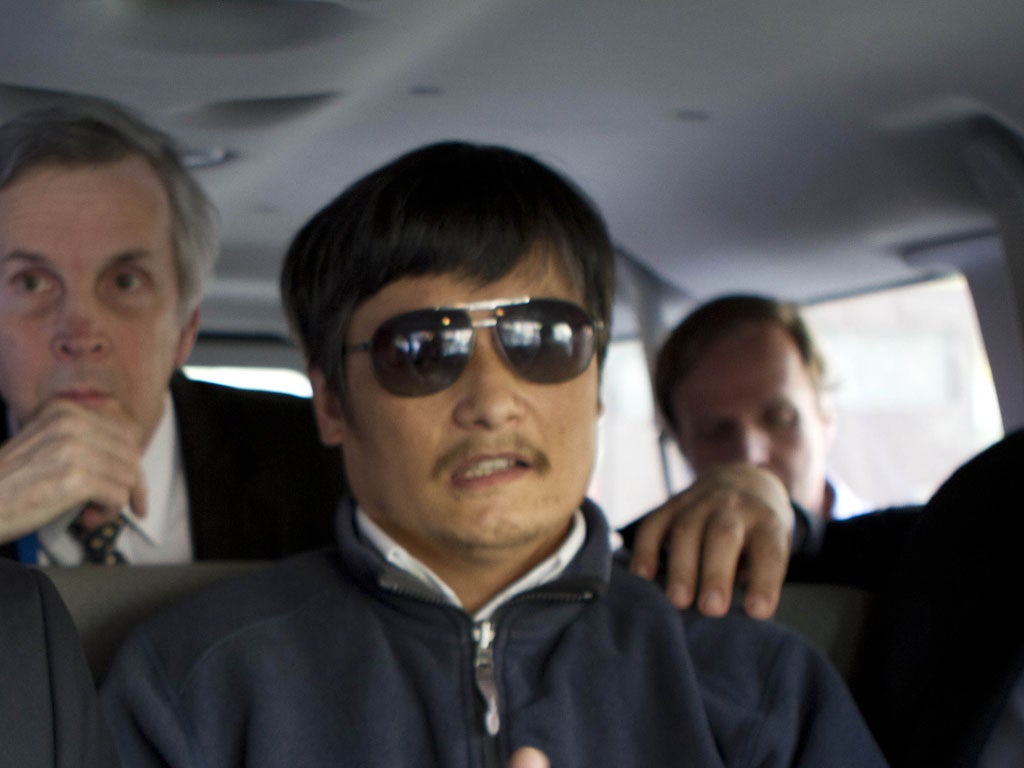US university offers blind dissident way out of China
Fellowship would allow both sides to save face after embarrassing diplomatic row

There were signs of a breakthrough in the curious case of Chen Guangcheng yesterday after China hinted that the blind dissident could travel to an American university that has offered him a fellowship, paving the way for a face-saving deal between Washington and Beijing.
The two countries have been walking a delicate diplomatic tightrope since the activist escaped from house arrest in Shandong province and arrived at the US embassy in the Chinese capital. Frenzied negotiations eventually saw him leave the embassy on Wednesday – only for him to change his mind, citing concerns about his family's safety, and presenting US and Chinese officials with a damaging and embarrassing conundrum.
Steps were afoot to limit the fallout yesterday, with the Chinese foreign ministry saying Mr Chen could apply to study abroad, a key demand of the self-taught lawyer and dissident. The move came after Mr Chen, in a message conveyed by a friend, said he had been sent a letter of invitation by New York University.
"Chen Guangcheng is currently being treated in hospital," a ministry spokesman, Liu Weimin, said in a brief statement. "If he wants to study abroad, he can apply through normal channels to the relevant departments in accordance with the law, just like any other Chinese citizen."
Mr Chen was placed under house arrest in 2010 after serving a four-year prison term. He had angered authorities by highlighting the brutal enforcement of China's one-child policy.
Shortly before the foreign ministry announcement, Mr Chen told Reuters his situation was not good. "I've just found out that when friends have come to visit me, they've been beaten up. As well, for two days I haven't been able to meet US embassy diplomats. They came here, but they weren't allowed inside to meet me. I think this situation is very bad," he said.
The announcement from the foreign ministry also came after Mr Chen spoke to a US congressional hearing, his voice on a mobile phone amplified for the gathered lawmakers. "I want to come to the US to rest. I have not had a rest in 10 years," he told the hearing.
Later, the US Secretary of State, Hillary Clinton, who was in Beijing for bilateral talks that have been overshadowed by the Chen affair, said the US ambassador, Gary Locke, had spoken to the activist and confirmed that wanted to travel to the US to study.
"Over the course of the day progress has been made to help him have the future that he wants and we will be staying in touch with him as this process moves forward," she said. "This is not just about well-known activists; it's about the human rights and aspirations of more than a billion people here in China and billions more around the world and it's about the future of this great nation and all nations."
Victoria Nuland, a spokeswoman for the US State Department, fleshed out the details in a statement, confirming that Mr Chen had been offered a place at an American university, and that he could be accompanied by his immediate family. "The Chinese government has indicated that it will accept Mr Chen's application for appropriate travel documents," she said.
Despite the possibility of a resolution to the saga, Chinese activists struck a note of caution. The human rights lawyer Tang Jitian said the overture from the Chinese foreign ministry "is positive news, but how it will play out we don't know", suggesting the authorities may yet hold up the paperwork.
There are also questions about what longer-term damage has been done to relations between the two countries. Chinese authorities are angry that the US embassy harboured Mr Chen and have demanded an apology and an investigation. Mr Chen stayed at the embassy for six days until Wednesday, when US officials took him to a Beijing hospital for treatment on his foot, which he broke during his escape.
Join our commenting forum
Join thought-provoking conversations, follow other Independent readers and see their replies
Comments
Bookmark popover
Removed from bookmarks